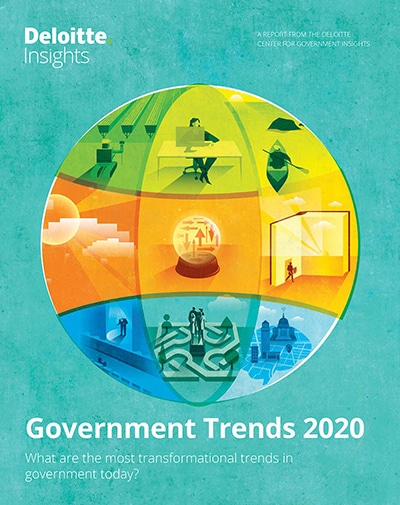
Citizen experience in government takes center stage Treating citizens like customers to drive triple value impact
6 minute read
24 June 2019
 Bruce Chew United States
Bruce Chew United States Jeneanne Rae United States
Jeneanne Rae United States Jason Manstof United States
Jason Manstof United States Stine Degnegaard United States
Stine Degnegaard United States
Coinciding with the digital wave, governments worldwide are increasingly focusing on customer experience as they seek to improve customer satisfaction, efficiency, and mission-effectiveness.
What do most successful companies have in common? They provide an exceptional customer experience (Cx). Leading companies know that putting customers at the heart of everything they do plays a critical role in improving overall performance.
In the same way, governments around the globe are recognizing the central importance of the citizen experience—and devoting resources to making it better.
The public sector has long sought to improve customer satisfaction, but raising additional resources or diverting existing resources to achieve this has met with resistance. Thanks to recent advances in digital technologies, however, coupled with new insights from behavioral science, governments worldwide are pursuing Cx more seriously. Government leaders who are looking to make a triple value impact—improving customer satisfaction, increasing efficiency, and enhancing mission-effectiveness—are increasingly focusing on Cx as a core function of government.1
This coincides with the digital wave in government. Worldwide, agencies such as the United Kingdom’s Government Digital Services,2 Singapore’s Government Technology Agency,3 and the Canadian Digital Services4 are dedicated to using digital technologies to improve the experience of citizens, businesses, and government employees. In the United States, the Office of Management and Budget in 2018 directed all executive branch agencies to incorporate Cx into their strategic decisions, culture, and design of services. Halfway across the globe, Design for Europe, a massive program cosponsored by the European Commission, is working to elevate Cx by promoting design awareness and knowledge exchange.5

Government agencies are embracing a number of different but highly complementary approaches in their Cx efforts, reflecting different starting points, missions, and challenges:
Human-centered design: Ensuring changes are designed outside-in. Human-centered design views problems from the lens of the user and develops solutions that consider their needs. While human-centered design promises a better Cx, it can also increase program buy-in, improve processes and efficiencies, and lower errors and costs in government programs.
Public-sector agencies across the globe are scaling efforts to develop citizen-centric services. The US Department of Veteran Affairs redesigned its website to create a more personalized experience for its customers and to eliminate the need for multiple logins, while Singapore’s Ministry of Health used creative communication strategies that focused on citizen engagement to improve health care outreach.6 In South America, Chile’s government innovation lab has used human-centered design (with cocreation) to tackle problems in health care, emergency housing, and energy.7
What’s more, many of these initiatives have yielded significant payoffs. The Department of Veteran Affairs website overhaul led to a 50 percent jump in online health care applications by veterans over the previous year.8 In another example, as part of New Zealand’s service innovation initiative, SmartStart helps new parents and caregivers more easily access a range of digital services during pregnancy and the months following birth, and allows them to establish a digital identity for their child.9 It has saved new parents many thousands of in-person visits to government offices.10
Service design: Integrating “front-stage” and “back-stage” elements. Service design marries human-centered design with other workflow tools to organize processes, technologies, and infrastructure to improve the quality of interactions between government and its customers. This integrated intervention can improve productivity, efficiency, and mission-effectiveness as well.
Governments are utilizing service design to improve both “back-stage” processes and front-facing interfaces. For example, the US Patent and Trademark Office (USPTO) used service design to improve the experience of small businesses and individual inventors new to pursuing patents and trademarks, many of whom were frustrated by the application process. It started by learning more about every step of new users’ experiences. This led the USPTO to create a “New to IP” link on its homepage that redirected new users to FAQs and a complete process path to applying for patent and trademarks, as well as quick and easy fixes, such as a cheat sheet on how to fill out the forms. These changes enabled small businesses and inventors to better navigate the patent process.
Inclusive design: Extending human-centered design further. The concept of inclusive design or universal design has also been gaining ground with governments, to help make their programs and services accessible to every citizen. What began with an emphasis on physical infrastructure to accommodate physical handicaps, such as lowering curbs and adding ramps to accommodate wheelchairs, has expanded to foster digital democracy and accommodate different languages as well as mental handicaps.
Examples of such initiatives include the partnership between UNICEF and the Government of Kenya to design accessible education for disabled children, Norway’s comprehensive “Universal Design Plan” to build “empathic” infrastructure, and the United Kingdom’s Sunderland City Council’s design-based approach to tackle long-term unemployment.11
Interestingly, innovations in artificial intelligence and the ubiquity of smartphones are enabling a new wave of inclusive design. For example, during 2018, Melbourne’s Southern Cross railway station conducted a pilot to help the visually impaired navigate inside the station. The eight-month project brought together national, state, city, and nonprofit resources to create and promote a real-time system that connected beacons installed at various points within the railway station to Blindsquare, a free GPS app that provides spoken directional advice through a smartphone.12
Measuring customer experience: Providing an informed foundation. Cx measurement platforms track an individual’s experience in order to prioritize improvements to the customer journey. For example, the Federal Acquisition Service at the US General Services Administration used feedback from its 2018 Customer Satisfaction Survey to improve services and savings for customers. The agency used fleet category management techniques to bring down the procurement time by 50 percent, reduce installation time by 26 percent, and realize cost savings of 20 percent.13 Better data drives better design, and better design drives citizen satisfaction.
Cocreation: Inviting the public’s input to improve services. Government does not just provide services to citizens; citizens also provide “services” back to the government. The most obvious example of this is when citizens elect leaders, but it can also be extended to solution design and even policy development. For example, Portugal’s participatory budget lets citizens present their investment ideas and vote on which projects to fund and implement. The budgeting process has two phases. First, citizens submit proposals via the website or in participatory meetings. They then vote on the regional and national projects they would like to see implemented. Portugal is the first nation to implement participatory budgeting at a national level. The budget’s second edition in 2018 received 1,418 proposals, of which 692 were voted on.14
Governments are increasingly embracing codesigning solutions with citizens. Some examples include South Korea’s Civic Participatory Service Design Team, which engages citizens in developing policy solutions; Denmark’s “cocreate” campaign for collectively building environmental solutions; and the US city of Albuquerque’s “design days” for codesigning solutions with small immigrant entrepreneurs.15
As governments become more digitally mature, Cx will be a cornerstone of government success, offering multiple dimensions of value. Cx tools can also be applied to the employee experience, which will in turn improve Cx. More broadly, as Cx becomes a core capability, it calls attention to not only the customer and employee experiences, but also the values, beliefs, and ambitions that drive behaviors and actions—what Deloitte is calling the human experience.16 However, agencies should also be careful of pitfalls associated with Cx initiatives, such as the failure to coordinate across agencies and delays in decision-making due to user testing fatigue.17 To help address these and other issues, government agencies have started hiring chief customer or citizen experience officers.18
Data signals
- Eighteen out of 28 EU countries have government-funded national design centers for policy and service design.
- The United Kingdom’s cross-government design community that works on human-centered design and user experience has more than 800 people.19
- The Lab, housed within the US Office of Personnel Management, has trained more than 2,000 government employees in human-centered design.20
Moving forward
- Inventory where you are or where you can collect customer data. Include qualitative and quantitative data. Go beyond sentiment to incorporate operational and financial data, which might require extending data collection activities.
- Standardize collection across channels with a clear architecture to roll up the data.
- Use analytics to derive insights from the data and prioritize changes.
- Infuse a holistic customer perspective informed by data into your design and decision process at all levels.
- Continuously improve Cx, incorporating new approaches and tools and leveraging data.
Potential benefits
- Increased citizen trust;
- Improved customer satisfaction;
- Improved employee engagement;
- Lower costs;
- Improved efficiency; and
- Better mission focus.
Risk factors
- Failure to keep up with rising expectations;
- Funding IT modernization;
- Coordination across silos and agencies; and
- Delays in deployment due to repeated testing.
Read more about how governments are enhancing customer experience in our Customer experience in government collection.
© 2021. See Terms of Use for more information.
Explore the collections
-
Anticipatory government Article5 years ago
-
Cloud as innovation driver Article5 years ago
-
Introduction Article5 years ago
-
Innovation accelerators Article5 years ago
-
Nudging for good Article5 years ago
-
Government Trends 2020 Collection5 years ago














